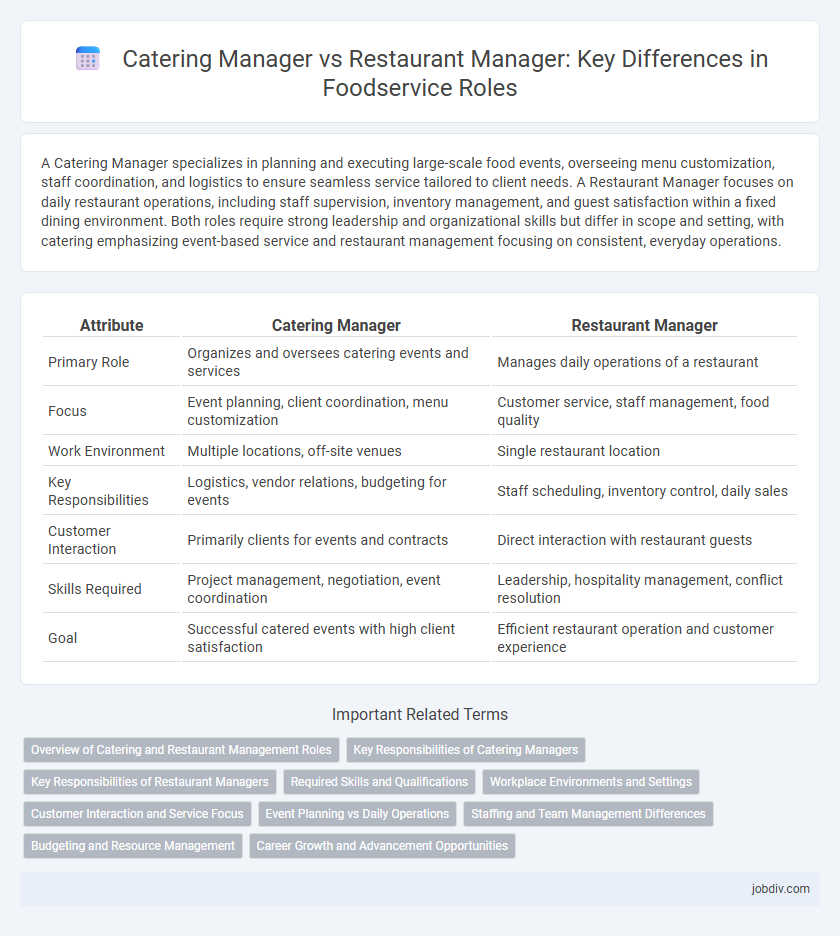A Catering Manager specializes in planning and executing large-scale food events, overseeing menu customization, staff coordination, and logistics to ensure seamless service tailored to client needs. A Restaurant Manager focuses on daily restaurant operations, including staff supervision, inventory management, and guest satisfaction within a fixed dining environment. Both roles require strong leadership and organizational skills but differ in scope and setting, with catering emphasizing event-based service and restaurant management focusing on consistent, everyday operations.
Table of Comparison
| Attribute | Catering Manager | Restaurant Manager |
|---|---|---|
| Primary Role | Organizes and oversees catering events and services | Manages daily operations of a restaurant |
| Focus | Event planning, client coordination, menu customization | Customer service, staff management, food quality |
| Work Environment | Multiple locations, off-site venues | Single restaurant location |
| Key Responsibilities | Logistics, vendor relations, budgeting for events | Staff scheduling, inventory control, daily sales |
| Customer Interaction | Primarily clients for events and contracts | Direct interaction with restaurant guests |
| Skills Required | Project management, negotiation, event coordination | Leadership, hospitality management, conflict resolution |
| Goal | Successful catered events with high client satisfaction | Efficient restaurant operation and customer experience |
Overview of Catering and Restaurant Management Roles
Catering managers coordinate large-scale food events, overseeing menu planning, staff scheduling, and client relationships to ensure seamless execution and customer satisfaction. Restaurant managers handle daily operations of dining establishments, focusing on inventory management, staff supervision, and maintaining service quality to optimize guest experience. Both roles require strong leadership and organizational skills tailored to different foodservice environments and customer demands.
Key Responsibilities of Catering Managers
Catering managers oversee event planning, menu coordination, and client communication to ensure seamless foodservice delivery for various occasions. They manage logistics, including staffing, budgeting, and vendor relations, to guarantee high-quality service and customer satisfaction. Unlike restaurant managers who focus on daily operations, catering managers specialize in customized event execution and off-site catering logistics.
Key Responsibilities of Restaurant Managers
Restaurant Managers oversee daily operations, including staff supervision, inventory management, and ensuring compliance with health and safety regulations. They coordinate with chefs and front-of-house staff to maintain service quality and customer satisfaction. Financial tasks such as budgeting, sales analysis, and cost control are also critical components of their responsibilities.
Required Skills and Qualifications
A Catering Manager requires strong event planning skills, expertise in menu design for large groups, and the ability to coordinate logistics for off-site events, often holding certifications in food safety and hospitality management. A Restaurant Manager needs proficiency in daily restaurant operations, staff supervision, customer service, and inventory control, usually backed by experience in foodservice management and sometimes a bachelor's degree in hospitality or business. Both roles demand excellent leadership, communication, and problem-solving skills, but catering focuses more on event-specific coordination while restaurant management emphasizes continuous operational efficiency.
Workplace Environments and Settings
Catering Managers primarily operate in dynamic, event-driven environments such as banquet halls, corporate functions, and large-scale celebrations, coordinating logistics and customized menus to meet client needs. Restaurant Managers oversee daily operations within fixed-location dining establishments, focusing on customer experience, staff management, and consistent food quality in a stable setting. Workplace demands for Catering Managers emphasize adaptability and event planning skills, whereas Restaurant Managers require expertise in managing ongoing restaurant workflows and frontline service.
Customer Interaction and Service Focus
Catering Managers prioritize personalized client consultations to tailor event menus and logistics, ensuring a seamless and customized guest experience. Restaurant Managers concentrate on overseeing daily dining operations, maintaining efficient service flow, and addressing immediate customer needs to uphold satisfaction. Both roles demand strong communication skills but differ in the scope and timing of customer interactions within the foodservice industry.
Event Planning vs Daily Operations
Catering managers specialize in event planning by coordinating menus, staffing, and logistics tailored to specific occasions, ensuring seamless execution of private and corporate events. Restaurant managers focus on daily operations, including managing staff schedules, inventory control, customer service, and maintaining cleanliness to optimize overall dining experience. Effective management in foodservice depends on catering managers' ability to handle large-scale events and restaurant managers' expertise in sustaining consistent service and operational efficiency.
Staffing and Team Management Differences
A Catering Manager typically oversees temporary staffing needs, coordinating large-scale events with flexible team members, while a Restaurant Manager maintains a consistent staff schedule focused on daily operations. Catering Managers emphasize efficient deployment of specialized teams for diverse events, requiring dynamic staffing strategies and rapid adaptability. Restaurant Managers prioritize employee training, retention, and consistent customer service quality through stable team management.
Budgeting and Resource Management
Catering Managers prioritize dynamic budgeting to accommodate fluctuating event sizes and specialized menu requirements, ensuring cost-efficiency in variable resource allocation. Restaurant Managers focus on steady budgeting aligned with daily operational expenses, optimizing inventory and labor costs for consistent service delivery. Effective resource management in catering demands flexibility and scalability, while restaurant management emphasizes routine control and waste reduction.
Career Growth and Advancement Opportunities
A Catering Manager's career growth often involves expanding into event coordination and large-scale hospitality management, leveraging skills in logistics and client relations. In contrast, a Restaurant Manager typically advances by managing multiple restaurant locations or moving into regional management roles, emphasizing operational efficiency and team leadership. Both roles offer distinct pathways, with Catering Managers focusing on event-based business development and Restaurant Managers on streamlined dining operations and brand management.
Catering Manager vs Restaurant Manager Infographic

 jobdiv.com
jobdiv.com